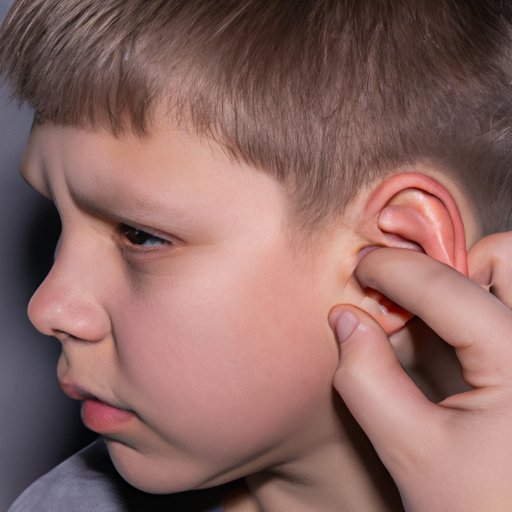
Introduction
Earaches can be a painful experience that affect people of all ages. They can be caused by a variety of factors, such as infection, injury, or wax buildup. Symptoms include pain, itching, and ringing in the ear. The purpose of this article is to provide readers with information on how to alleviate and prevent earaches.
Home Remedies
Home remedies can be an effective way to treat earaches. They are typically easy to access and use, and can often be done with items found around the house. Some common home remedies for earaches include warm compresses, over-the-counter ear drops, and essential oils. Warm compresses are easy to create with a clean cloth and warm water, and can help to reduce inflammation and relieve pain. Over-the-counter ear drops can also help to reduce pain and inflammation, although it’s important to follow the instructions carefully. Essential oils, such as lavender or tea tree oil, can be added to warm compresses or mixed with carrier oils to create a calming, soothing effect.
Medical Treatments
If home remedies do not alleviate the earache, it may be necessary to seek medical treatment. Possible treatments include antibiotics, ear tubes, and surgery. Antibiotics are commonly prescribed for ear infections, and can help to clear up the underlying cause of the earache. Ear tubes may also be recommended to help drain fluid and relieve pressure in the ear. In more severe cases, surgery may be required to address the underlying cause of the earache. It’s important to discuss the pros and cons of each treatment option with a healthcare provider to determine the best course of action.
Prevention
The best way to treat an earache is to prevent it from occurring in the first place. There are several preventative measures that can be taken, such as avoiding loud noises, using earplugs, and practicing good hygiene. For example, wearing earplugs when attending concerts or using power tools can help to protect the ears from damage. Practicing good hygiene, such as washing hands frequently and avoiding sharing personal items like earbuds or headphones, can also help to prevent infection. Additionally, staying properly hydrated, avoiding smoking, and minimizing exposure to allergens can also help to prevent earaches.
When to See a Doctor
While home remedies and preventative measures can often alleviate earaches, it is important to know when it is necessary to seek medical attention. Symptoms such as lasting pain, dizziness, or fever may indicate a more serious condition that requires medical treatment. When visiting a healthcare provider for an earache, they may perform tests or recommend treatments such as antibiotics, ear cleaning, or ear irrigation.
Causes of Earache
Earaches can be caused by a variety of factors, such as infection, injury, or wax buildup. It is important to identify the underlying cause of the earache in order to effectively treat it. For example, ear infections may be caused by bacteria or a virus, while excessive earwax buildup can create pressure and lead to an earache. Prevention strategies for each cause may vary, but may include avoiding exposure to allergens, cleaning the ears regularly, and using earplugs when swimming or showering.
Lifestyle Changes
There are additional lifestyle changes that can help to prevent and alleviate earaches. Maintaining a healthy diet, staying well-rested, and avoiding stress can help to boost overall immune function and reduce inflammation. Additionally, reducing exposure to loud noises, maintaining good air quality, and protecting the ears from injury can help to prevent earaches.
Conclusion
Earaches can be a painful and uncomfortable experience, but there are steps that can be taken to alleviate and prevent them. By using home remedies, seeking medical treatment when necessary, and implementing preventative measures, individuals can take proactive steps to reduce the severity and frequency of earaches. Remember to always consult with a healthcare provider when experiencing persistent pain or other symptoms.




